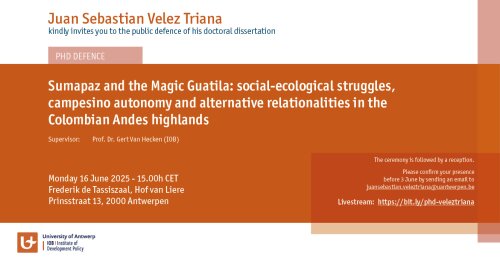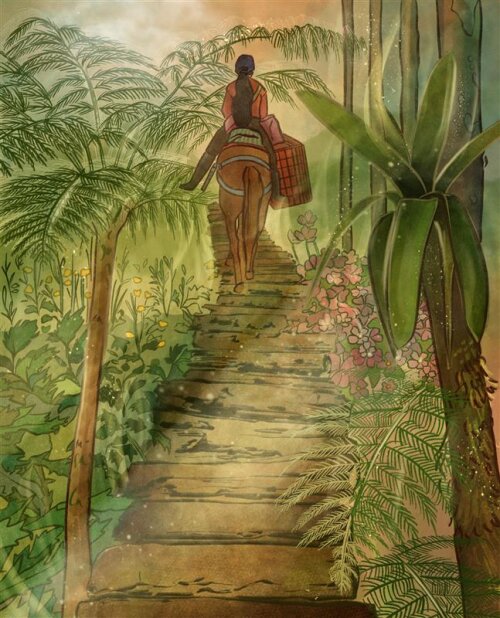Sumapaz and the Magic Guatila: social-ecological struggles, campesino autonomy and alternative relationalities in the Colombian Andes highlands
- Supervisor: Prof. dr. Gert Van Hecken
- Date: Monday 16 June 2025 - 15.00h CET
- Venue: Frederik de Tassiszaal, Hof van Liere, Prinsstraat 13, 2000 Antwerpen
- Follow the livestream through this link: https://bit.ly/phd-veleztriana-teams

Abstract
The central objective of this research is to comprehend how processes of social-ecological transformation, campesino struggles for territorial autonomy, activism, and politically engaged research get entangled in social-ecological struggles aimed at creating more just and sustainable realities. Following an ethnographic and participatory action research (PAR) approach developed to support the autonomous project to create a Campesino Reserve Zone in Upper Venecia, in the high-Andes forests of Sumapaz (Colombia), the research delves into how campesino struggles, ecological change, activist agendas, and researchers get entangled to contest dominant understandings of conservation and the highland ecosystems, pursuing a deconstruction of such understandings from the standpoint of locally situated agrarian movements and strengthening contemporary struggles for territorial autonomy. This implies approaching social-ecological transformations and resistance processes through a relational lens interested in understanding the multiple possible articulations at political, ethical, moral, epistemic, and material dimensions between ecological change, social movements, activism, and research. The research builds on a scalar political ecology approach based on the intersection of different disciplinary traditions, such as environmental anthropology, critical geography, and the social-ecological systems (SES) framework. I seek to show how campesino accommodations to, and resistance against, technical-scientific conservation is a defense of their world and livelihoods against the imposition of a dominant understanding of nature and conservation that operates both through epistemic violence and through material dispossessions such as military operations, land evictions, economic sanctions and environmental restrictions over campesino practices.
I argue that the primary contribution of emerging alternative relationalities within collaborative research lies within its praxis, which mobilizes alternative ways of producing knowledge to generate social-ecological transformations from below. In making this argument, I highlight the importance of alternative languages, creativity, and traditional artistic expressions in incorporating diverse forms of knowledge into collaborative processes. This approach will help shift the focus away from academically trained researchers as the central figures of transdisciplinary collaborations and place it within the needs and aspirations of social movements, the social-ecological struggles in which they are engaged, and the transformative horizons that arise from these collaborations. This research serves both as an attempt and a call to engage with the challenging task of deconstructing our epistemological perspectives to forge social-ecological mobilizations of knowledge and actions aimed at creating alternative and just realities during a time of global ecological crisis and deepening social inequalities.
